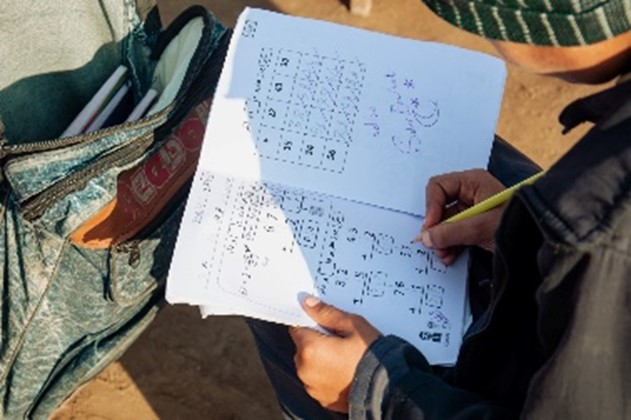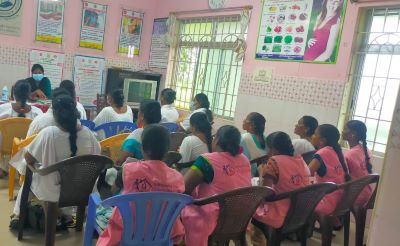
Pakistan has over 20 million out-of-school children (OOSC). Sindh has one of the highest numbers and rates of OOSC among the country’s four provinces, and the province also has large gender gaps in education indicators. Behind the low enrolment of girls is the poor quality of teaching due to the chronic shortage of teachers, leading many parents/guardians to believe that there is no point in sending children to school. Furthermore, in addition to the prolonged school closure for COVID-19 and the economic downturn, religious and cultural beliefs such as “education is not necessary because girls get married” and “it is unsafe to send girls to schools with male teachers” are also believed to have affected the enrolment of girls.
To improve enrolment and retention, it is crucial to involve communities and parents/guardians. In particular, involving female guardians in discussions and awareness raising is key to increasing girls’ attendance and retention. The project has therefore addressed this by activating the School Management Committees (SMC), which consists of headteachers and guardians, as a participatory body for community discussion in which both male and female guardians can participate. Today, there are female guardians who understand the significance of education and are taking on leadership roles at SMC. Moreover, the project has introduced the “morning math workbook time” before classes start to improve the quality of learning, which has shown an improvement in basic numeracy skills and attendance. Together with the Sindh School Education and Literacy Department, the project is working to establish the structure needed to run these activities independently and sustainably.

Tamil Nadu is the most urbanized state in India, with approximately 8.64 million people (according to the 2011 census) considered poor, living in slum areas. Strengthening access to public healthcare services for the growing urban population is an urgent issue. The incidence of cancer and diabetes in Tamil Nadu is higher than the national average. Therefore, there is a growing need for measures to improve NCDs (Non Communicable Diseases) prevention and control, including early detection and treatment. In light of the above, the “Tamil Nadu Urban Health Care Project,” a yen loan project, is being implemented to improve the quality of the urban health care system, mainly through the development of secondary and tertiary health care facilities.
At the same time, in addition to the support provided by the above-mentioned yen loans, there is also a need to strengthen administrative management capacity to address NCDs and to strengthen the clinical capacity of medical practitioners due to the increasingly advanced medical care. Under these circumstances, this Project focuses on cancer among NCDs and aims to strengthen the administrative management capacity and the clinical capacity of medical personnel. Specifically, the Project focuses on early detection and continuous care of cancer and aims to improve the quality of cancer screening programs, strengthen the practices of early cancer diagnosis, and improve clinical skills and practices for cancer diagnosis and treatment in close collaboration with relevant government officials and medical experts at the state and district level. In addition, the Project will also support the promotion of awareness-raising among community people, as it is reported that their health-seeking behavior for cancer-related services is poor due to the low level of knowledge as well as a strong sense of fear and stigma against cancer.

Consulting and Technical Assistance Mission on Universal Health Coverage for the African Region (Cote d’Ivoire and Senegal) (Client: JICA)
Project on Health Financing Management at District Level, South Africa (Client: JICA)
Study on IFNA (Initiative for Food and Nutrition Security in Africa) (Client: JICA)
Study on Facilitation for ICSA and Training Course of IFNA (Client: JICA)
Study on Universal Health Coverage in Myanmar (Client: JICA)
Study on Health Sector Policies to Promote Universal Health Coverage (UHC) for Women, Children and the Poor in Côte d’Ivoire (Client: JICA)
Preliminary feasibility survey on the LOMT International Hospital development in Viet Nam (Client: JICA)
Project for Strengthening the Capacity to Plan and Implement Digital Health Project (Client: JICA)
Study on Health Sector in Nepal (Client: JICA)